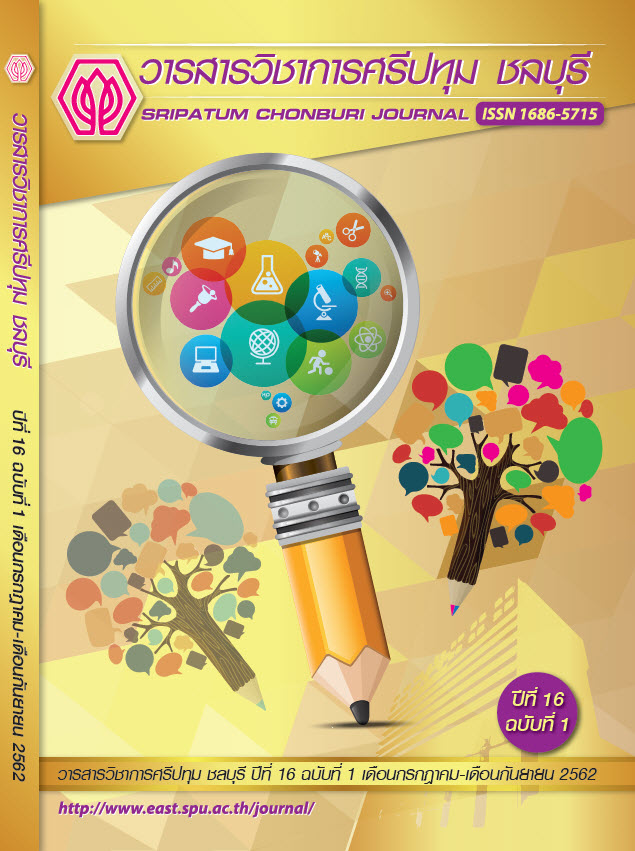อิทธิพลของการเรียนรู้ขององค์กรและวิสัยทัศน์ระยะยาว ที่มีต่อผลการดำเนินงานของธุรกิจโรงแรมในประเทศไทย
คำสำคัญ:
การเรียนรู้ขององค์กร, วิสัยทัศน์ระยะยาว, พฤติกรรมการเป็นสมาชิกที่ดีขององค์กร, ความผูกพันต่อองค์กร, ผลการดำเนินงานขององค์กรบทคัดย่อ
การวิจัยนี้มีวัตถุประสงค์ (1) เพื่อศึกษาอิทธิพลของการเรียนรู้ขององค์กรและวิสัยทัศน์ระยะยาวที่ส่งผลต่อพฤติกรรมการเป็นสมาชิกที่ดีขององค์กร (2) เพื่อศึกษาอิทธิพลของพฤติกรรมการเป็นสมาชิกที่ดีขององค์กรที่ส่งผลต่อผลการดำเนินงานของธุรกิจโรงแรมในประเทศไทย และ (3) เพื่อตรวจสอบอิทธิพลของตัวแปรแทรกของความผูกพันต่อองค์กรที่ส่งผลต่อความสัมพันธ์ระหว่างการเรียนรู้ขององค์กร วิสัยทัศน์ระยะยาว และพฤติกรรมการเป็นสมาชิกที่ดีขององค์กร กลุ่มตัวอย่างเป็นผู้บริหารธุรกิจโรงแรมในประเทศไทย จำนวน 212 คน เครื่องมือที่ใช้เป็นแบบสอบถาม วิเคราะห์ข้อมูลโดยใช้สถิติพรรณนา ประกอบด้วย ความถี่ ร้อยละ ค่าเฉลี่ย และค่าส่วนเบี่ยงเบนมาตรฐาน สถิติสำหรับการทดสอบสมมติฐานคือ การวิเคราะห์การถดถอยอย่างง่ายและการวิเคราะห์การถดถอยพหุคูณ พบว่าการเรียนรู้ขององค์กรและวิสัยทัศน์ระยะยาวขององค์กรส่งผลเชิงบวกต่อพฤติกรรมการเป็นสมาชิกที่ดีขององค์กร พฤติกรรมการเป็นสมาชิกที่ดีขององค์กรส่งผลในเชิงบวกต่อผลการดำเนินงานขององค์กร อิทธิพลของตัวแปรแทรกความผูกพันต่อองค์กรไม่เป็นตัวแปรแทรกของความสัมพันธ์ระหว่างการเรียนรู้ขององค์กรและวิสัยทัศน์ระยะยาวขององค์กรต่อพฤติกรรมการเป็นสมาชิกที่ดีขององค์กร
เอกสารอ้างอิง
ชุติมา ชุติชิวานันท์. (2554). พฤติกรรมการเป็นสมาชิกที่ดีขององค์การ (organizational citizenship behavior) ที่มีผลต่อองค์การแห่งการเรียนรู้ (learning organization): กรณีศึกษา กลุ่มธุรกิจผู้ให้บริการโทรศัพท์เคลื่อนที่. กรุงเทพฯ: สถาบันวิจัยและให้คำปรึกษาแห่งมหาวิทยาลัยธรรมศาสตร์.
นรชัย ณ วิเชียร และวิโรจน์ เจษฎาลักษณ์. (2561). ปัจจัยเชิงสาเหตุที่ส่งผลต่อพฤติกรรมการเป็นสมาชิกที่ดี
ขององค์การ ของพยาบาลประจำหอผู้ป่วย โรงพยาบาลภูมิพลอดุลยเดช. วารสารการจัดการสมัยใหม่, 16(1), หน้า 101-116.
ปกรณ์ ลิ้มโยธิน. (2558). พฤติกรรมการเป็นสมาชิกที่ดีขององค์การในธุรกิจโรงแรม. วารสารหาดใหญ่
วิชาการ, 13(2), หน้า 155-165.
พุทธชาด ลุนคำ. (2560). แนวโน้มธุรกิจ/อุตสาหกรรมปี 2561-63: ธุรกิจโรงแรม (ออนไลน์). เข้าถึงได้จาก:
https://www.krungsri.com/bank/getmedia/9027bab8-d979-4f28-9ff3- f21444f5dab1/%20IO
Hotel_2017_TH.aspx [2561, 19 กุมภาพันธ์].
สิริทิพย์ ฉลอง. (2560). ธุรกิจโรงแรม (ออนไลน์). เข้าถึงได้จาก: https://www.gsb.or.th/getattachment/
8b641705-e232-481b-ad78-9a02f12b5255/IN_hotel_9_60_detail.aspx [2561, 19 กุมภาพันธ์].
Aaker, D. A., Kumar, V., & Day, G. S. (2001). Marketing research. New York, NY: John Wiley and Son.
Ahmadi, A., Daryani, S. M., & Bevrani, H. (2014). Evaluation of organizational learning process based
on Marquardt Model, Case study: Municipality of Noor City, Iran. International Journal of
Management and Innovation, 6(1), pp. 56-62.
Altiok, P. (2011). Applicable vision, mission and the effects of strategic management on crisis resolve.
Procedia Social and Behavioral Sciences, 24, pp. 61-71.
Avinash, K., & Lima, R. (2009). Identification of causes of organizational citizenship behavior: A qualitative study of LIC managers. Indian Journal of Social Science Researches, 6(2), pp. 17-28.
Chang, C. C, Tsai, M. C, & Tsai, M. S. (2011). Organizational citizenship behaviors and organizational
commitments of organizational members influences the effects of organizational learning.
International Journal of Trade, Economics and Finance, 2(1), pp. 61- 66.
Coetzer, A. J. (2006). Employee learning in New Zealand small manufacturing firms. Employee Rela-tions, 28(4), pp. 311-325.
Coetzer, A., & Perry, M. (2008). Factors influencing employee learning in small businesses. Education
and Training, 50, pp. 648-660.
Cronbach, Lee J. (1990). Essentials of psychological testing (5th ed.). New York, NY: Harper Collins.
Daft, R. L. (2008). The leadership experience (3rd ed.). Mason, OH: South-Western.
Egan, T. M., Yang, B., & Bartlett, K. R. (2004). The effects of organizational learning culture and job
satisfaction on motivation to transfer learning and turnover intention. Resource Development
Quarterly, 15(3), pp. 279-301.
Hair, J. F., et al. (2010). Multivariate data analysis: A global perspective (7th ed.). Upper Saddle River,
NJ: Pearson Education.
Kaya, A. (2015). The relationship between spiritual leadership and organizational citizenship behaviors:
A research on school principals’ behaviors. Educational Sciences: Theory and Practice, 15(3),
pp. 597-606.
Mason, C. H., & Perreault Jr., W. D. (1991). Collinearity, power, and interpretation of multiple regression analysis. Journal of Marketing Research, 28, pp. 268-280.
Neter, J., Wasserman, W., & Michael, H. K. (1985). Applied linear statistical models: Regression, analysis of variance, and experimental designs (2nd ed.). Homewood, IL: Richard D. Irwin.
Nunnally, J. C. (1978). Psychometric theory (2nd ed.). New York, NY: McGraw-Hill.
Nunnally, Jum C., & Bernstein, Ira H. (1994). Psychometric theory. New York, NY: McGraw-Hill.
Organ, D. W. (1988). Organizational citizenship behavior: The good soldier syndrome. Lexington,
MA: Lexington Books.
Organ, D. W., Podsakoff, P. M., & MacKenzie, S. B. (2006). Organizational citizenship behavior: Its
nature, antecedents, and consequences. Thousand Oaks, CA: Sage.
Podsakoff, P. M., et al. (2000). Organizational citizenship behaviors: A critical review of the theoretical
and empirical literature and suggestions for future research. Journal of Management, 26(3), pp. 513-563.
Saadat, Vajiheh, & Saadat, Zeynab. (2016). Organizational learning as a key role of organizational suc-cess. Procedia-Social and Behavioral Sciences, 230, pp. 219-225.
Yamane, Taro. (1973). Statistics: An introductory analysis. New York, NY: Harper and Row.
ดาวน์โหลด
เผยแพร่แล้ว
ฉบับ
ประเภทบทความ
สัญญาอนุญาต
บทความทุกบทความเป็นลิขสิทธิ์ของวารสารวิชาการศรีปทุม ชลบุรี



